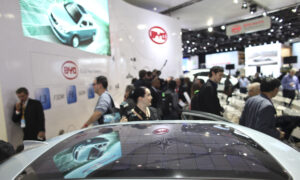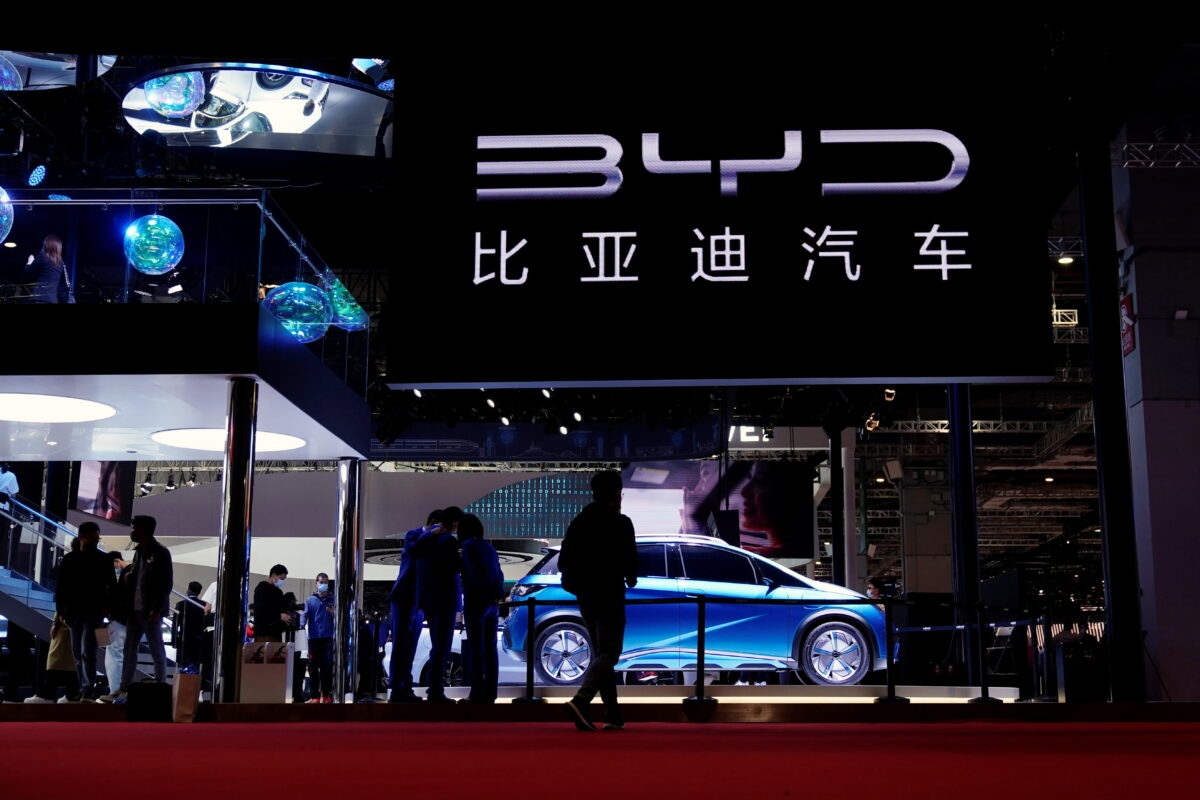China’s Electric Vehicles Could Destroy America
Commentary Since 2020, China’s electric vehicle makers have been on a streak. Other vehicle manufacturers are starting to look nervously in their rear-view mirrors, err … cameras, and in some cases, side-views. Some, like Volvo, are even looking at their stock and realizing that a Chinese competitor has already bought a controlling share. Is China’s growing EV dominance an example of the so-called cooperation with China on global challenges like climate warming? Does the Biden administration deserve to ballyhoo it all as another shining example of U.S.-China cooperation? No. Beijing is the world’s worst polluter and an existential threat to democracy. It uses its weak environmental regulations and lousy labor policies to outcompete U.S. car manufacturers on price. Every dollar that China makes can be turned by Beijing into military aggression and human rights abuse, up to and including genocide. By allowing EV makers to outsource production to China from the United States, Europe, Japan, South Korea, and other allied countries, consumers in advanced democracies may be getting cheaper cars now. Still, they will pay in the long run when China monopolizes the supply chain. The Chinese Communist Party (CCP) could, for example, pressure the United States by stopping the shipment of vehicle batteries. Russia attempted something similar against Europe by stopping the flow of natural gas shortly after the start of the Ukraine war. Beijing had used such pressure before, when it stopped the shipment of rare earth elements, necessary in a broad range of manufacturing, to Japan in 2010. It didn’t work in either case, but Moscow’s belief that it had leverage because of Europe’s gas dependence likely figured in Russian President Vladimir Putin’s decision to invade Ukraine. A second advantage handed to China in the world’s switch from gas is that EV engines are simpler than the gas and diesel engines they replace. Gone will be the comparative advantage that higher-skilled engineers and workers in market democracies had. “The switch to battery means the motor is no longer a differentiator,” Alexander Klose, an officer at a Chinese EV manufacturer, told Bloomberg. He added, “It’s created a level playing field.” The article, published on Jan. 25, had the headline, “The US Hasn’t Noticed That China-Made Cars Are Taking Over the World.” In 2021, Japan led in passenger vehicle exports, Germany and China were neck-in-neck for second place, and the United States and South Korea trailed behind. Since 2020 as the EV revolution hit, China is gaining fast. The output of all its competitors is either stalling or, in the case of the United States, falling. Japanese car companies are slow off the block from hybrid vehicles to pure electric. According to Reuters on Jan. 23, “Lapping them are Chinese firms, which appear best-positioned to keep their pole position, both at home and internationally.” People visit the BYD booth during a media day for the Auto Shanghai show in Shanghai, China, on April 19, 2021. (Aly Song/Reuters) On Jan. 24, The Wall Street Journal reported that Ford was in talks to sell one of its plants in Germany to BYD, China’s biggest EV maker. The tightest choke point in the EV supply chain is battery manufacturing. BYD has it covered. China manufactures 56 percent of all EV batteries, and the CCP will put China’s EV makers first in line. BYD outsold Tesla in 2022, and already sells electric cars and buses in Europe. Buying the Ford plant in Germany “would give BYD a stronghold for further expansion on the continent,” according to the Journal. A third advantage to Beijing from the world moving away from oil is that China has very little of it. The United States has a lot, so the shift is particularly painful for relative U.S. economic strength. China’s defeat of America’s oil and vehicle industries, after so many others have already gone, will put downward pressure on good American jobs. Industrial cities will atrophy more than they already have. Crime and drug use will rise. Governments from the local to the national levels will lose tax revenue. Fewer dollars will go to social and defense spending. Into that power vacuum, repeated in democracies around the world, the CCP will step. According to an article on Jan. 24 published by The Heritage Foundation, “China is engaged in an economic war with democracies around the globe and America must stay energy-independent. … If electric vehicles overtake the internal combustion engine, America should not cede its energy independence to China or other unfriendly nations.” This is the reality of the cheap, shiny electric cars that make us feel great about saving the planet in so much style that our neighbors shrink with envy. But that wilting will not stop at the neighbor’s fence. We will all diminish together as the CCP’s power grows. Our best defense is decoupling from China, including when we buy an EV. Views expressed in this article are the opinions

Commentary
Since 2020, China’s electric vehicle makers have been on a streak.
Other vehicle manufacturers are starting to look nervously in their rear-view mirrors, err … cameras, and in some cases, side-views. Some, like Volvo, are even looking at their stock and realizing that a Chinese competitor has already bought a controlling share.
Is China’s growing EV dominance an example of the so-called cooperation with China on global challenges like climate warming? Does the Biden administration deserve to ballyhoo it all as another shining example of U.S.-China cooperation?
No. Beijing is the world’s worst polluter and an existential threat to democracy. It uses its weak environmental regulations and lousy labor policies to outcompete U.S. car manufacturers on price. Every dollar that China makes can be turned by Beijing into military aggression and human rights abuse, up to and including genocide.
By allowing EV makers to outsource production to China from the United States, Europe, Japan, South Korea, and other allied countries, consumers in advanced democracies may be getting cheaper cars now. Still, they will pay in the long run when China monopolizes the supply chain.
The Chinese Communist Party (CCP) could, for example, pressure the United States by stopping the shipment of vehicle batteries. Russia attempted something similar against Europe by stopping the flow of natural gas shortly after the start of the Ukraine war. Beijing had used such pressure before, when it stopped the shipment of rare earth elements, necessary in a broad range of manufacturing, to Japan in 2010. It didn’t work in either case, but Moscow’s belief that it had leverage because of Europe’s gas dependence likely figured in Russian President Vladimir Putin’s decision to invade Ukraine.
A second advantage handed to China in the world’s switch from gas is that EV engines are simpler than the gas and diesel engines they replace. Gone will be the comparative advantage that higher-skilled engineers and workers in market democracies had.
“The switch to battery means the motor is no longer a differentiator,” Alexander Klose, an officer at a Chinese EV manufacturer, told Bloomberg. He added, “It’s created a level playing field.”
The article, published on Jan. 25, had the headline, “The US Hasn’t Noticed That China-Made Cars Are Taking Over the World.”
In 2021, Japan led in passenger vehicle exports, Germany and China were neck-in-neck for second place, and the United States and South Korea trailed behind.
Since 2020 as the EV revolution hit, China is gaining fast. The output of all its competitors is either stalling or, in the case of the United States, falling.
Japanese car companies are slow off the block from hybrid vehicles to pure electric. According to Reuters on Jan. 23, “Lapping them are Chinese firms, which appear best-positioned to keep their pole position, both at home and internationally.”

On Jan. 24, The Wall Street Journal reported that Ford was in talks to sell one of its plants in Germany to BYD, China’s biggest EV maker.
The tightest choke point in the EV supply chain is battery manufacturing. BYD has it covered. China manufactures 56 percent of all EV batteries, and the CCP will put China’s EV makers first in line.
BYD outsold Tesla in 2022, and already sells electric cars and buses in Europe. Buying the Ford plant in Germany “would give BYD a stronghold for further expansion on the continent,” according to the Journal.
A third advantage to Beijing from the world moving away from oil is that China has very little of it. The United States has a lot, so the shift is particularly painful for relative U.S. economic strength.
China’s defeat of America’s oil and vehicle industries, after so many others have already gone, will put downward pressure on good American jobs. Industrial cities will atrophy more than they already have. Crime and drug use will rise. Governments from the local to the national levels will lose tax revenue. Fewer dollars will go to social and defense spending.
Into that power vacuum, repeated in democracies around the world, the CCP will step.
According to an article on Jan. 24 published by The Heritage Foundation, “China is engaged in an economic war with democracies around the globe and America must stay energy-independent. … If electric vehicles overtake the internal combustion engine, America should not cede its energy independence to China or other unfriendly nations.”
This is the reality of the cheap, shiny electric cars that make us feel great about saving the planet in so much style that our neighbors shrink with envy. But that wilting will not stop at the neighbor’s fence. We will all diminish together as the CCP’s power grows.
Our best defense is decoupling from China, including when we buy an EV.
Views expressed in this article are the opinions of the author and do not necessarily reflect the views of The Epoch Times.












